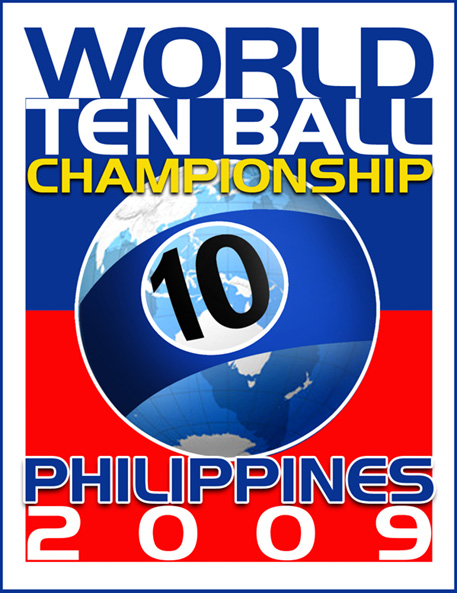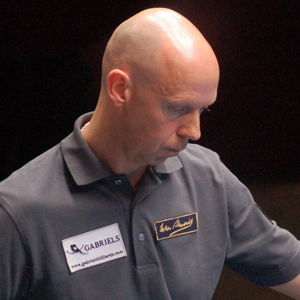World Trade Center
Philippine National Bank Complex
Manila Bay Area
Metro Manila
Philippines
www.tedlerner.com
25-30 November 2009

IS 10 BALL THE PERFECT GAME?
The discipline of 10-ball was formally adopted into the World Pool Association(WPA) system in December, 2007. Now, only two years on, few people would doubt that the game has not only been a success, but is here to stay.
From Europe to the USA to Asia, 10 ball tournaments have become as ubiquitous as 9 ball tournaments. World renowned cue manufacturer Predator has given its backing to a big international 10 ball tour. A World 10 ball championship for women was held for the first time ever this year. And now, of course, an absolute powerhouse, world class field has assembled in Manila for the second World Ten Ball Championship.
The worldwide recession forced the World 8 ball and 9 ball championships off the calendar this year, and the World 10 ball championship has taken center stage as the biggest and most important world pool championship in 2009 for men.

"Read More..." for the details.
While nobody in the sport is happy about the 8 ball and 9 ball world championships not having taken place this year, it is, nonetheless an amazing leap upwards for the discipline of 10 ball to stand alone in the spotlight of the pool world. Just a little more than two years ago, 10 ball was nothing more than a fringe game, simply 9 ball with one extra ball, and played mostly in smoke filled Manila pool halls. 10 ball was favored over 9 ball because the better players were tired of losing money matches due to the easy break shot fostered by the 9 ball diamond rack.
Now 10 ball has clearly emerged as its own game. There are even those within the sport who claim that 10 ball as it is played now represents the absolute highest level a billiard discipline could reach. They point to the fact that the triangular rack has brought the power back to the break shot and the intricacy back to the subsequent pattern play. They note that the game’s unique rules have rung just about every ounce of luck out of what had become of 9-ball, and now reward sheer hard work and the highest quality play. Just listen to what Ralf Souquet, one of the greats of the game, has to say about 10 ball.
“I’m absolutely happy with the way 10 ball is being played now,” Souquet said. “I would say it’s the one billiard discipline that comes close to being perfect. 10 ball is the best game.”
When Darren Appleton won the first world 10-ball championship in Manila last year he said afterwards: “What a game! It’s a lot more skillful than 9-ball. It’s a game where you’ve got to play pretty good safeties. You’re not guaranteed a shot after the break. It’s a true test of skill.”
 Labeling 10 ball “perfect” and “the best game” is not something that will get too many arguments from players and others close to the sport, who are nearly one in praising the game’s toughness. So as 10 ball takes its place firmly alongside older and better known pool disciplines, it might be instructive to take a look back at how it all came together.
Labeling 10 ball “perfect” and “the best game” is not something that will get too many arguments from players and others close to the sport, who are nearly one in praising the game’s toughness. So as 10 ball takes its place firmly alongside older and better known pool disciplines, it might be instructive to take a look back at how it all came together. Although there were many people pushing for some time for 10 ball to solve the inherent flaws in 9 ball, it took one man’s vision and appetite for extreme risk to make it happen. Even while he was spending a fortune bringing in the 2006 and 2007 World 9 ball championships to the Philippines, Yen Makabenta dreamt of bringing 10 ball to the world stage.
“Even when we were hosting the World Pool Championship in 2006, I had already made inquiries about hosting a 10-ball world championship,” Makabenta said, “I just felt this was where pool was going. And I decided then that I was going to make a presentation to the WPA for the formal creation of a world 10-ball championship.”
Makabenta was motivated by several factors. First was the fact that nobody in the Philippines was playing 9-ball anymore. Secondly he saw the fixes being employed in 9 ball as mere band-aids.
“The game had become too easy,” Makabenta said. “There were perpetual problems with the rack, and then promoters would offer up ridiculous solutions, like having to get a certain amount of balls past the head string, switching tables, moving the spot, etc.”
Makabenta, however, had other reasons to push the 10-ball world championship. As evidenced by the millions of dollars he risked bringing in the two World 9-ball Championships, he wanted to do big things in pool. And he believed that his country, the Philippines, was the perfect place to have the biggest pool events, and could, and should be the world’s capital of pool.
“I told my friends and colleagues in the sport,” Makabenta recalls, “if we can get a 10-ball world championship for the Philippines, we can nurture and grow our very own world championship event. Now we can have a signature event for our country. We could have our own Wimbledon.’”
So shortly after the 2007 World Pool Championship in Manila, in which the soft break was a major issue, Makabenta traveled to Germany and made a presentation before the WPA board of governors, who were holding their annual general assembly. The WPA board liked the idea of having another World Championship, but was concerned that 10-ball would be seen as simply 9-ball with one extra ball.
“If we were going to adopt 10-ball as another game,” said WPA president, Ian Anderson, “we had to make the rules different, to make the game different. We encouraged input from a lot of different people.”
Those included people like veteran pool journalist and now WPA board member Jerry Forsyth, who back in December, 2007, famously wrote a widely publicized article entitled, “9 ball—a funeral whose time has come.” In the article, Forsyth declared that the diamond shape rack of 9-ball had passed its “Use By” date by encouraging soft breaking, predictable and repetitive patterns, and thus, a boring professional game.
 ”I was encouraged by Jerry Forsyth,” Makabenta said. “He had been saying in writing the very things I and many others had thought about 9-ball.” The WPA also consulted with various players, including Johnny Archer, Thorsten Hohmann, several Filipino players, and Souquet.
”I was encouraged by Jerry Forsyth,” Makabenta said. “He had been saying in writing the very things I and many others had thought about 9-ball.” The WPA also consulted with various players, including Johnny Archer, Thorsten Hohmann, several Filipino players, and Souquet.Souquet was delighted to hear that 10 ball was about to become a major discipline. Back in early 1990’s, as he was on his way to establishing his reputation as one of the greats of the game, Souquet crafted what he hoped at the time would become a new set of new rules for 9-ball. Souquet’s main quest in trying to rewrite the rules of 9-ball back then was to remove any and all luck out of the game.
“In 9-ball, if you get lucky once or twice in a whole set, you can win the match, “ Souquet says. “I never liked luck involved. I’ve lost more matches when my opponent got lucky that I can remember. I’d rather play by rules that reward hard work and good play, not luck.” Souquet’s noble quest, however, was ultimately met with indifference.
“At the time nobody wanted to see a change to the rules of 9-ball,” he said. “The rules were the rules. Anyway in the early 90’s, there were not many players who could run 4 or 5 racks in a row in a tournament. Not as often as nowadays. Now a lot of players can string racks together. The level of play has gone up big time. Players now practice a lot more and they even exercise. Pool is a physical game now. The equipment is better. And there are more players from more countries. “
Souquet filed away the rules on his laptop for many years, until late in 2007 when he found out that the WPA had just approved 10-ball as one its disciplines and was looking to adopt new rules.
“I told them about the new rules that I had written and they said, ‘Forward it to us.’“
Many of Souquet’s recommendations were adopted, as were ideas from other people. Among the most noteworthy rules; all pocketed balls had to be called, flukes no longer counted, and safeties in which a ball is pocketed could be handed back to the original player. At first the golden break rule remained, but this year the WPA has finally removed it. Now sinking the 10 on the break doesn’t win you the game. Overall the result has been positive.
“In Euorpe everyone likes the new rules,” Souquet said. “I’ve never had any bad feedback.”
“The players believe 10-ball is more competitive,” Makabenta said.
Detractions have come not from the rules of the game but from those that don’t believe the game plays well on television because of the longer racks. The thinking goes that pool already has a hard enough time getting on TV, and that a slower game like 10 ball isn’t going to help attract the kind of mass audience the sport needs to grow. Those who’ve pushed 10 ball, however, don’t buy it.
 “TV production companies always want fast, exciting games,” Souquet said. “Like a game show. That’s OK for some events, but not for serious titles like World Championships. There are no real golf tournaments where you don’t play four rounds over four days. Tennis matches go on for three hours.“ And according to Makabenta, the growing popularity of 10-ball has had an interesting side effect; as players become more familiar with the game and the rules, match times have sped up.
“TV production companies always want fast, exciting games,” Souquet said. “Like a game show. That’s OK for some events, but not for serious titles like World Championships. There are no real golf tournaments where you don’t play four rounds over four days. Tennis matches go on for three hours.“ And according to Makabenta, the growing popularity of 10-ball has had an interesting side effect; as players become more familiar with the game and the rules, match times have sped up.“Before a race to 9 would have taken two hours or more,” Makabenta said. “Now they’ve cut 45 minutes off matches. The players have caught up with the game. Now that they play it regularly, the matches are faster.”
Perhaps even more remarkable is that the rise of 10 ball has hardly taken away the shine from the exciting game of 9 ball. In fact, it appears the new discipline has helped raise the profile for all of pool.
“Ten ball’s been a success,” Anderson said. “The players really like 10-ball. Now there are 10-ball tournaments being played everywhere. We had the World 10-ball for men, and now for women. We had the Philippine Open and a number of other tournaments. And it hasn’t detracted from 9-ball. We have the Qatar Open. We’ve also had new events for 9-ball like the China Open and the Women’s World 9 ball in China.”
For time being, though, it is 10 ball that will take center stage; six glorious days of the finest and toughest pool action, played by 128 of the best players in the world, in the very heart of a country where pool is adored like no other place on earth.
Whoever emerges the winner of this long haul of a World Championship will no doubt carry the moniker of “hardcore” along with “world champion.” It’s just the perfect scenario that a dreamer like Makabenta had in mind.
“I was always convinced that once people play 10-ball, it will catch on,” Makabenta said. “I’m not saying that it has killed 9-ball. 10-ball, however, is a keeper, it’s here to stay and it will grow.”
Ted Lerner is a freelance journalist and sports television commentator based in the Philippines. He is a member of the United States Billiard Media Association and is currently the Philippines’ correspondent for Billiards Digest magazine. He will be the play by play commentor on this year’s World 10-ball Championship. Email Ted at ted@tedlerner.com. Or visit his website at www.tedlerner.com.